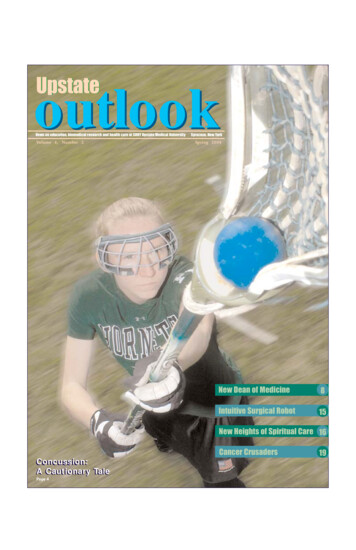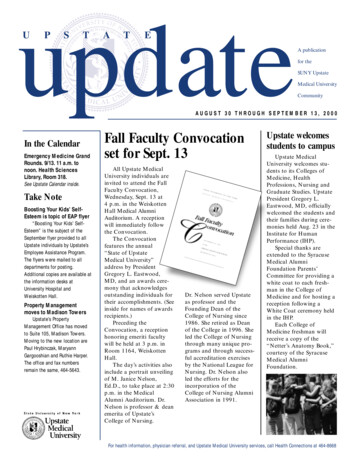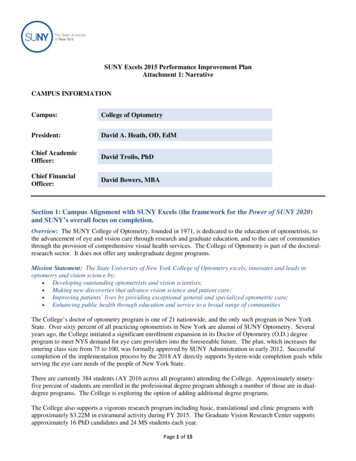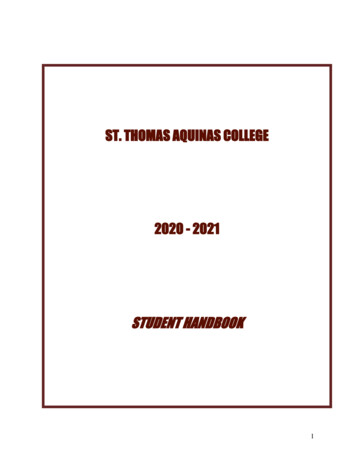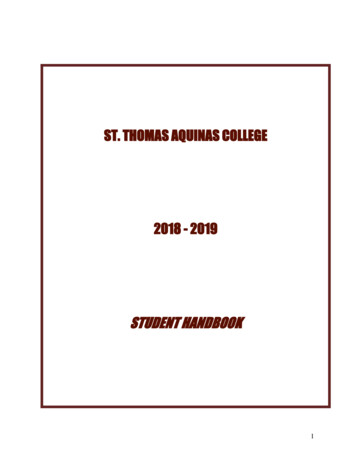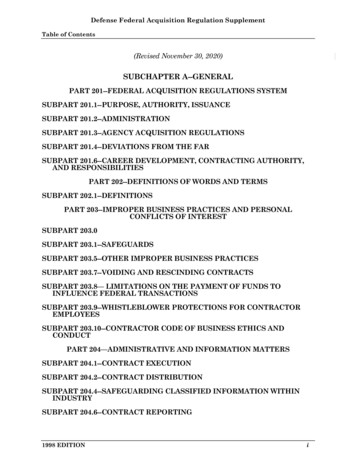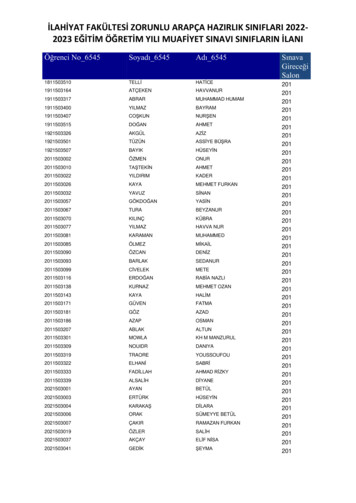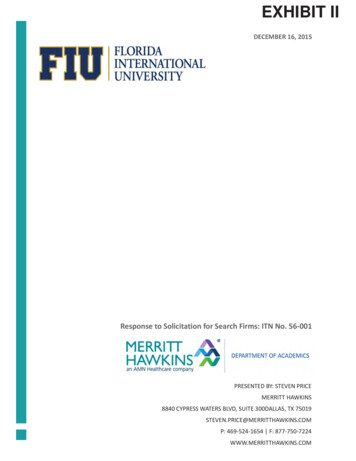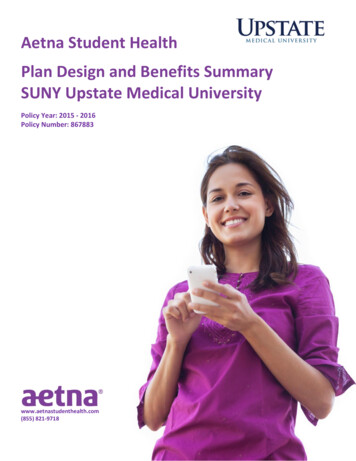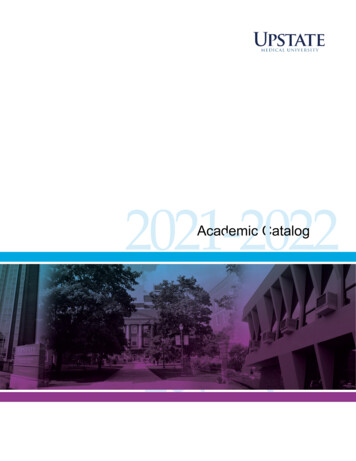
Transcription
2021-2022201 4Academic CatalogAcdemicCatalog
Upstate Medical UniversityThe Academic Catalog accurately reflected curricular program requirements and coursedescriptions at the time of its publication. However, Upstate reserves the right to changethe policies, including academic requirements, at any time.Please see the following resources for additional information:Academic cademic/records/calendars.phpAdmission requirements, financial aid and tuition and fees:http://www.upstate.edu/prospective/The College of Graduate Studies:http://www.upstate.edu/grad/The College of Health Professions:http://www.upstate.edu/chp/The College of Medicine:http://www.upstate.edu/comUpstate Public Health:http://upstate.edu/mph/The College of Nursing:http://www.upstate.edu/con/Student Life – Academic Resources – Support Services – Student Handbook:http://www.upstate.edu/currentstudents/
SUNY Upstate Medical UniversityThe State University of New York (SUNY) UpstateMedical University encompasses the College of GraduateStudies, College of Health Professions, College ofMedicine, College of Nursing, and a clinical systemcomprising Upstate University Hospital with its downtownand community campuses, the region’s only children’shospital, and an extensive network of specialty treatmentservices. Upstate educates physicians, research scientists,nurses, and public health and health care professionals.Upstate also provides graduate medical education, postdoctoral opportunities and a variety of continuing educationfor health professionals in the region.Upstate Medical University traces its origins to 1834 wheneducators founded a medical school at Geneva College totrain doctors for communities along the Erie Canal. In1849, the school gained the distinction of awarding an MDdegree to Elizabeth Blackwell, the first woman to graduatewith an MD in this country.In 1871, the medical school dean bought the college’smedical library, anatomical museum, and other tangibleassets. He and another Geneva faculty member approachedSyracuse University and offered to donate these materialson condition that Syracuse University immediatelyestablish and maintain a medical college consistent withAmerican Medical Association standards. With supportfrom the Onondaga County Medical Society, the Genevamedical faculty joined the Syracuse University College ofPhysicians and Surgeons, later known as the College ofMedicine. In 1875, the new school was the third in thenation to adopt a three-year graded program, preceded onlyby Harvard Medical School and Chicago Medical College.In 1936, President Franklin D. Roosevelt laid thecornerstone for a new teaching facility for medicaleducation. This structure, later named Weiskotten Hall afterthe college’s dean, Herman G. Weiskotten, remains thecenter of the basic science complex. It houses researchlaboratories, instructional rooms, the Health SciencesLibrary and faculty offices.A program leading to the MS and PhD degrees inbiochemistry was initiated in 1947 while the MedicalCollege was still a part of Syracuse University. Theprogram was then incorporated into the Graduate Programof the newly organized State University and expanded toinclude anatomy, microbiology, physiology andpharmacology, as well as medical technology. Today, theCollege of Graduate Studies currently offers MS and/orPhD degrees in six biomedical research disciplines.In 1950, Upstate became part of the State University ofNew York, a public higher education system that currentlyincludes sixty-four campuses.The College of Health Professions was added in 1956 andoffered a certificate in cytotechnology. The College wasofficially organized in 1971 to offer associates andbachelor’s degrees in the allied health professions. Thecollege currently offers upper-division and graduatedegrees in eight health specialties.In the late 1970s, the “Clinical Campus” at Binghamtonwas established. This site offers clinical educationprograms for third- and fourth-year medical students.The College of Nursing was established in 1985 with aunique MS degree program for registered nurses and hasexpanded its offerings to meet the needs of registerednurses in the Central New York region. The College wasfully accredited by the National League of Nursing in Fall1991. It currently offers a BS completion program for RNs,masters programs to become a nurse practitioner, and aDNP program. The College is fully accredited by theCommission on Collegiate Nursing Education.As the University developed its programs, it also saw greatexpansion of its physical plant. Growth in the1960s and1970s included University Hospital, the Campus ActivitiesBuilding, Clark Tower residence hall and Jacobsen Hall,which now houses administrative offices. A nine-storyaddition to Weiskotten Hall, a three-level parking garage,and the Campus West Building were all constructed withboth public and private funding.In 1983, the Regional Oncology Center was built and in1985 a Pediatric Intensive Care Unit was added to thefourth floor of University Hospital. A day-care center wasadded in 1991 to meet the needs of Upstate’s students,faculty and staff. The Health Sciences Library wascompleted in 1995 and the first major expansion of theUniversity Hospital, a 52 million East Wing addition, wascompleted in 1996. In 2000, the Institute for HumanPerformance opened to house an array of biomedicalscientists, rehabilitation specialists and educators workingto reduce the impact of aging, illness and injury. Thefacility includes the largest block of research space oncampus outside Weiskotten Hall, and a major expansionwas completed in fall 2013. The Setnor Academic Buildingopened in the spring of 2007. Expansion of UniversityHospital to include the Upstate Golisano Children’sHospital, the only one in the region, was realized in 2009.A new Upstate Cancer Center, the region’s onlycomprehensive outpatient resource for the treatment ofcancer and blood disorders for adults and children, openedin 2014. The New Academic Building opened in 2015 andprovides administrative and classroom space for theColleges of Health Professions and Nursing. A newUniversity Simulation Center opened in the fall of 2019.
By building upon its history and dedication to excellence,Upstate Medical University continues to expand servicesand to develop resources in virtually every field ofmedicine, making a major contribution to the quality of lifein central New York and beyond.National Accrediting Agency for Clinical LaboratorySciences (NAACLS)5600 North River Road, Suite 720Rosemont, IL 60018Phone: 773-714-8880The mission of SUNY Upstate Medical University is toimprove the health of the communities we serve througheducation, biomedical research and health care.College of Medicine:Liaison Committee on Medical Education (LCME)330 North Wabash Avenue, Suite 39300Chicago, IL 60611-5885Phone: 312-464-4933The vision of Upstate Medical University is “United inexpertise, compassion and hope to create a healthier worldfor all.” The mission and visions are achieved through ourshared values. We drive innovation and discovery byempowering our university to bring forth new ideas and toensure quality; We respect people by treating all with graceand dignity; We serve our community by living ourmission; We value integrity by being open and honest tobuild trust and teamwork and to embrace diversity andinclusion.”AccreditationThe SUNY Upstate Medical University is accredited by theMiddle States Commission on Higher Education (MSCHE),3624 Market Street, 2nd Floor West, Philadelphia, PA19104, Phone: 267-284-5000. All educational programsare registered through the New York State Department ofEducation and are approved by the Veterans Administrationfor the training of veterans under Public Law 98-358.Program specific accreditation is provided by the following:College of Health Professions:Accreditation Review Commission on Education for thePhysician Assistant, Inc. (ARC-PA)12000 Findley Road, Suite 150Johns Creek, GA 30097Phone: 770-476-1224Commission on Accreditation for Respiratory Care(CoARC)1248 Harwood RoadBedford, TX 76021-4244Phone: 817-283-2835Commission on Accreditation in Physical TherapyEducation (CAPTE)1111 North Fairfax StreetAlexandria, VA 22314Phone: 703-706-3245Commission on Accreditation of Allied Health EducationPrograms (CAAHEP)1361 Park StreetClearwater, FL 33756Phone: 727-210-2350Joint Review Committee on Education in RadiologicTechnology (JRCERT)20 North Wacker Drive, Suite 2850Chicago, IL 60606-3182Phone: 312-704-5300Middle States Commission on Higher Education (MSCHE)3624 Market Street, 2nd Floor WestPhiladelphia, PA 19104Phone: 267-284-5000Council on Education for Public Health (CEPH)1010 Wayne Avenue, Suite 220Silver Springs, MD 20910Phone: 202-789-1050College of Nursing:Commission on Collegiate Nursing Education (CCNE)655 K Street, NW, Suite 750Washington, DC 20001Phone: 202-887-6791Discrimination Policy and Title IXPursuant to University policy, the University is committedto fostering a diverse community of outstanding faculty,staff, and students, as well as ensuring equal educationalopportunity, employment, and access to services, programsand activities, without regard to an individual’s race, color,national origin, religion, creed, age, disability, sex, genderidentity, sexual orientation, familial status, pregnancy,predisposing genetic characteristics, military status,domestic violence victim status, or criminal conviction.Employees, students, applicants or other members of theUniversity community (including but not limited tovendors, visitors, and guest) may not be subject toharassment that is prohibited by law, or treated adversely orretaliated against based upon a protected characteristic.The University’s policy is in accordance with the federaland state laws and regulations prohibiting discriminationand harassment. These laws include the Americans withDisabilities Act (ADA), Section 504 of the RehabilitationAct of 1973, Title IX of the Education Amendments of1972, Title VII of the Civil Rights Act of 1964 as Amendedby Equal Employment Opportunity Act of 1972, and theNew York State Human Rights Law. These laws prohibitdiscrimination and harassment, including sexual harassmentand sexual violence.Inquiries regarding the application of the Title IX and otherlaws, regulations and policies prohibiting discriminationmay be directed to the Chief Diversity, Equity andInclusion Officer, Office of Diversity and Inclusion, (DaryllDykes), 711 Jacobsen Hall, Upstate Medical University;Telephone: (315) 464-5232; Email: DykesD@upstate.edu.
Inquiries may also be directed to the United StatesDepartment of Education’s Office for Civil Rights, 32 OldSlip 26th Floor, New York, NY 10005-2500; Tel. (646)428-3800; Email: OCR.NewYork@ed.gov.discipline, and updated accreditation standards as publishedby the professional organizations. Any significant changein a course or a change in a program of study is required tobe approved by the respective Curriculum Committee.Assignment of Credit HoursGeneral Education RequirementsSUNY Upstate Medical University, as part of the StateUniversity of New York, has adopted the Carnegie Unit asa measure of academic credit. This is in compliance withthe SUNY Policy on Credit/Contact Hour (DocumentNumber 1305) and the United States Department ofEducation definition of a credit hour as “an amount of workrepresented in intended learning outcomes and verified byevidence of student chments/GEN1106.pdf)Both the State University of New York and the MiddleStates Commission on Higher Education require students inall undergraduate programs to prepare students in a breadthof general education requirements. The general educationprogram must include the study of quantitative andscientific reasoning, written and oral communication,critical analysis and reasoning, information literacy andtechnological competency, and values, ethics, and diverseperspectives.Upstate Medical University offers a variety of instructiontype of courses, including the standard lecture andlaboratory courses. In addition, as an academic healthscience center, many of our courses are practicums. Eachcollege reviews and approves their own curriculum.However, all follow the format of a standard credit hourawarded for fifteen 50-minute sessions of classroominstruction with a normal expectation of two hours ofoutside study for each class session. Therefore, a typicalthree credit hour course at Upstate Medical Universitymeets for three 50-minute sessions per week for a fifteenweek semester, and thus totaling 45 sessions. Anotherformat commonly used is the practicum course, such as ourclinical courses. For these courses, credit is awarded asdefined by the State University of New York (DocumentNumber 1305) for full-time independent study.Specifically, for clinical courses that meet full-time, onesemester credit hour is awarded for each week of thecourse. For clinical courses that are not full-time, butrather interspersed with other coursework, one semestercredit hour is awarded for every forty-five hours ofinvolvement on the part of the student. As an example, aclinical course that meets for nine hours a week over thecourse of fifteen weeks would be assigned three semestercredit hours.On the basis of their upper-division status and relevantaccreditation requirements, the Office of the SUNY Provosthas waived several SUNY General Education requirementsfor undergraduate programs at Upstate Medical University.This waiver was granted based on the fact that all bachelor'sdegree programs are upper division and students enter withprerequisites of 60 credits, having met most of theknowledge and skill areas required by SUNY GenEd. Theremaining GenEd requirements will be completed throughtheir program of study at Upstate. The requirement formathematics is met as a prerequisite requirement in theCollege of Health Professions, or by taking statistics in theCollege of Nursing. Other course requirements in theprograms fulfill the Gen Ed distribution requirements asfollows: Professional Communications, Professional &Technical Writing (Basic Communication), ResearchMethods, Research in Nursing (Scientific and CriticalReasoning, Information Management), and Health CareEthics, Ethics, Nursing and the Health Professions (Values,Ethics and Diverse Perspectives).New courses, revisions to current courses, and the programsof study are each approved through their respective collegecurriculum committee. It is the charge of each of theseCommittees to review and approve the curriculum incompliance with all federal, SUNY and nationalaccreditation guidelines. In addition, many programs mustbe individually accredited by their respective professionalorganizations. Depending on the College, the approval forall curriculum may only rest with the CurriculumCommittee or it may also require approval by the facultyorganization of the College.The ultimate authority for the curriculum of each collegerests with the dean of the college who ultimately isresponsible for ensuring that programs are reviewedperiodically. Usually the review of programs andcurriculum is an on-going process with reviews occurringannually based on student feedback, changes in theMore information about General Education Requirementsat Upstate is available atwww.upstate.edu/prospective/basics/suny gened requirements.php.
Degree ProgramsProgramsDegree Level(s)DepartmentAnatomyMSCell and Developmental BiologyAnatomy and Cell BiologyPhDCell and Developmental BiologyApplied Behavior AnalysisMSBiochemistryMSBiochemistry and MolecularBiology041426.0202PhDBiochemistry and MolecularBiology041426.0202Cardiorespiratory SciencesBSRespiratory Therapy Education129951.0908Cardiovascular PerfusionBSCardiovascular Perfusion122351.0906Medical Imaging SciencesBS and BPSMedical Imaging Sciences122551.0911Medical BiotechnologyBSClinical Laboratory Sciences049926.1201Medical TechnologyBS and MSClinical Laboratory gyMS***Microbiology and Immunology041126.0502Microbiology andImmunologyNeurosciencePhDMicrobiology and Immunology041126.0502PhDNeuroscience and Physiology042530.2401120351.3801Biochemistry andMolecular BiologyHEGISCode*CIP Code**041226.0403041226.040742.2814BS, MS, PostMaster’s Adv. Cert.and DNPMS*** and PhDPharmacology040926.1001Physician AssistantStudiesPhysical TherapyMSPhysician Assistant1299.1051.0912DPTPhysical Therapy121251.2308Public HealthMPH and Adv.Cert.MS and PhDPublic Health and PreventiveMedicineNeuroscience and Physiology121451.2207041026.0901Radiation TherapyTechnologyBS and BPSRadiation Therapy122551.0907Respiratory CareBSDepartment of RespiratoryTherapy *****New York State Higher Education General Identification System numberU.S. Department of Education: Classification of Instructional Programs 2010 numberCurrently not offered to incoming students
College of Graduate StudiesThe College of Graduate Studies educates students to bebiomedical research scientists, preparing them for careers inacademic medical centers, colleges and universities,biomedical research institutes, the biotechnology industry, andgovernment agencies. The College educates graduate studentsthrough its six biomedical science programs, awarding PhDdegrees and MS degrees as noted: Anatomy: MSAnatomy and Cell Biology: PhDBiochemistry: MSBiochemistry and Molecular Biology: PhDMicrobiology: MSMicrobiology and Immunology: PhDNeuroscience: PhDPharmacology: MS and PhDPhysiology: MS and PhD**Not accepting students at this time.The MD/PhD program at SUNY Upstate MedicalUniversity is designed for college graduates who seek themedical training and advanced research skills required forcareers in academic medicine and medical research. Thiseight-year, dual-degree program combines our medicalschool (College of Medicine) with our graduate school inbiomedical sciences (College of Graduate Studies).Degree and Program OverviewDoctoral Degreewww.upstate.edu/grad/curriculum/phd degrees.phpThe PhD degree – including research, didactic course workand successful defense of a dissertation – is intended to becompleted in four to six years.First Year: All first-year students participate in three labrotations of their choosing. Lab rotations give studentsexposure to diverse research environments and help themselect a mentor with whom to do their dissertation research.To help students select their rotation labs, the college offersthe Graduate Student Research Opportunities course duringthe first three weeks. In this course, representatives from eachof the six biomedical sciences programs describe the researchinterests of their faculty members. A faculty advisor also helpsstudents select their rotation labs. All first-year students alsoparticipate in a core curriculum designed to provide a broadbased education in the biomedical sciences. The first-year corecurriculum courses are: Foundations of Molecular and CellularBiology, covering fundamental and advanced topics inbiochemistry, molecular biology and cell biology; Principlesof Biostatistics, introducing the basic principles of biostatisticfor research; and Journal Club where students practiceanalyzing papers and giving oral presentations. Beginning inJanuary, students take electives. By the end of the springsemester, students begin focusing on research. Students selecta mentor and become affiliated with their mentor's degreegranting program at the end of the first year.Second Year: By the start of the second year, most PhDstudents have begun work on the research project that willlead to their dissertation. During this year, students take theResponsible Conduct of Scientific Research course, whichexamines research ethics and the moral and philosophicalissues confronting scientists, and continue to take electivesbased on their research interests as well as courses required bytheir program. All students take a program specific grantwriting course. Students pass a qualifying exam to becomecandidates for the doctoral degree. This exam is scheduled bythe end of the second year.Later Years: In their second year, students put together adissertation advisory committee, comprised of three to sixfaculty members from different departments. The committeemeets every six months to review the student's progress, makesuggestions and provide direction. To assist in the guidance ofa student’s career planning, the student and advisor develop acareer development plan which is updated and shared annuallywith the advisory committee to help a student meet theirplanned goal. After completing their research projects,students write a dissertation and defend it before a dissertationdefense committee.Master’s he master's degree program typically takes two to three yearsto complete. Master's students participate in selected parts ofthe core curriculum along with PhD students. However, unlikePhD students who usually affiliate with a degree-grantingprogram at the end of their first year, master's students join adegree-granting program from the start. Master's studentswrite and defend a thesis, but they do not take a qualifyingexam.Additional required courses are determined by degree grantingprogram and the advisor.MD/PhD pstate Medical University’s MD/PhD Program is designedfor individuals interested in pursuing a career as physicianscientists in academic medicine. During the students first twoyears of training students complete required courses in theCollege of Medicine curriculum (see College of Medicinesection of the Academic Catalogue). They then advance intothe laboratory where they spend three to four years completingadditional coursework and dissertation research under the
guidance of one of the faculty members in College ofGraduate Studies. The time in the laboratory culminates withthe defense of the doctoral dissertation, after which studentsre-enter the College of Medicine to complete their training inthe required clinical clerkships and electives. The total timespent in the program should be no more than eightyears. Throughout the training students will also participate inMD/PhD specific coursework and activities.Annual stipends and tuition scholarships are provided forstudents during enrollment in the MD/PhD program.MD/PhD students may receive up to but no more than 12elective credits in the College of Medicine (COM) for researchwhich will count toward fulfilling the COM graduationrequirement of 25 elective credits. MD/PhD students mustapply for this research credit; please see the Student Handbookfor details. Alternatively, MD/PhD students are eligible toapply up to 9 credits from the Grand Rounds Course towardsCollege of Medicine elective credits (see above).There can be 24 credits transferred from the COM to theCollege of Graduate Studies (CGS). These credits are basedon criteria set forth by the Graduate Programs, the Dean ofCollege of Graduate Studies, and the MD/PhD Program Codirectors. The courses transferred are those that fulfill theCGS core curriculum and correlate with the degree-grantingprogram in which the student is enrolled.The MD/PhD Grand Rounds course is a required course for allstudents in all years of the program. MD/PhD students in thefirst year of their PhD are required to take the MD/PhD grantwriting course.For MD/PhD course descriptions, see below.Prior to graduation from the program each student must haveat least one accepted first-author publication of experimentaldata from their dissertation work in a peer-reviewed journal.Graduate Studies Core CurriculumCourse DescriptionsGS604 Graduate Student Research Opportunities0 Credit HoursSemester Offered: FallCourse Description: With one full afternoon per program,each of the six PhD training programs will describe itscurrently active research projects. This description will bepresented in a format which the program’s faculty feels bestdisplays all its research activities. Two major goals of thesepresentations are to: 1) acquaint the incoming graduatestudents with the breadth of research being pursued withineach graduate program, and 2) to thereby give the incominggraduate students further information upon which to base theirown choice of research area and advisor for their dissertations.Prerequisites: None. Textbook(s): None.GS612 Biomedical Sciences Laboratory Rotations2 Credit Hours/RotationSemester Offered: Year roundCourse Description: The purpose of the rotation is to learnnew research skills and more about the research of a potentialdissertation advisor, and to potentially lay the groundwork fora future dissertation. Biomedical Sciences PhD students arerequired to do three laboratory rotations, taken consecutively,in the first year. Rotations begin approximately September,January and March. An optional fourth rotation in the summermay be taken. MD/PhD students are required to do twolaboratory rotations, one each summer prior to their medicalschool years one and two (an optional third rotation may betaken). Written report due to Advisor at the end of eachrotation. Prerequisites: None. Textbook(s): None.GS616 Foundations of Molecular and Cellular Biology4 Credit HoursSemester Offered: FallCourse Description: This course provides a comprehensivebackground for students in the Biomedical Sciences Program.It covers fundamental and advanced topics in biochemistry,molecular biology, and cell biology. Lectures and discussionsare based on primary research articles, reference books, andlecture notes. Major divisions of the course are 1) properties ofbiomolecules, 2) cell organization and regulation, and 3) cellfunction. Prerequisites: None. Textbook(s): None.MPHP602 Principles of Biostatistics3 Credit HoursSemester Offered: FallCourse Description: This course introduces the basicprinciples of biostatistics and requires students to apply theseprinciples to describe and analyze health data. Topics includedescriptive statistics, probability distributions, point andinterval estimation of population parameters, and hypothesistesting. A variety of one and two-sample tests for continuousand categorical data are covered, as is analysis of variance andregression modeling. Students will learn to analyze data usingSPSS software and interpret output and results.Prerequisites: None. Textbook(s): None.GS637 Responsible Conduct of Scientific Research(Research Ethics)2 Credit HoursSemester Offered: FallCourse Description: The faculty instructors participate inlecture and discussion with the students. The lecture topicsinclude Authorship, Peer Review and Plagiarism, Conflicts ofInterest, Policies on Research Misconduct, Human Subjects,Animal Subjects, and Intellectual Property. Prerequisites:None. Textbook(s): Francis L. Macrina, Scientific Integrity, 4thedition.
GS892 Introduction to the Presentation and Analysis ofScientific Literature: Journal Club1 Credit HourSemester Offered: FallCourse Description: This course gives students theopportunity to read, critically evaluate, and present researcharticles in a variety of fields. During this course students areexpected to develop a high standard of scientific analysis andgood public presentation skills. Students will be required topresent one to two paper(s) each semester depending on timeavailability and to actively participate in class discussionswhen not presenting. This course is required for all first yeargraduate students in the fall semester but, if space is available,it is also offered as an elective for advanced students.Prerequisites: None. Textbook(s): None.For additional Graduate Studies general electives, see coursedescriptions listed on page 19.Biochemistry and Molecular BiologyProgram and Degree RequirementsCIP Code: 26.0202This program awards: PhD in Biochemistry and Molecular Biology MS in BiochemistryFaculty researchers in Biochemistry and Molecular Biologyseek to understand the molecular and cellular bases of humanhealth and disease. They apply a broad range of tools rangingfrom those of structural biology and biophysics to cell biologyand genetics. Faculty with expertise in X-ray crystallography,single-molecule electron microscopy, and spectroscopyinvestigate protein structure, folding, and interactions at theatomic level. Other faculty members employ modern geneticsand genomic technologies to integrate the above informationwith in vivo studies to generate a broader understanding ofcellular pathways and systems biology. This comprehensivestrategy is reflected by the diverse approaches that ourresearchers take, from high-resolution structural and singlemolecule studies to the use of animals and single-celledorganisms to model disease processes and development.Areas of focus in the Department of Biochemistry andMolecular Biology include membrane and transport proteinstructure and function, DNA replication and transcription,cellular responses to stress, epigenetics and energymetabolism. These studies impact disorders from cancer toneurodegenerative diseases to pathogenic infections. Ourprogram boasts a robust and long-standing record ofextramural funding, particularly from the National Institutes ofHealth.PhD Degree Requirements:Required Graduate Courses:GS604 Graduate Student Research OpportunitiesGS616 Foundations of Molecular and Cellular BiologyMPHP602. Principles of BiostatisticsGS637 Responsible Conduct of Scientific ResearchGS612 Biomedical Sciences Laboratory Rotations (x3)GS892 Introduction to the Presentation and Analysis ofScientific Literature: Journal ClubB617 Methods of Biochemistry and Molecular BiologyResearchB620 Biochemistry SeminarB648 Research Design in Biochemistry and MolecularBiologyB650 Scientific Writing in BiochemistryElectives: At least 6 credits of Advanced Biochemistry andMolecular Biology elective courses are required. (Note:GS
Medical University encompasses the College of Graduate Studies, College of Health Professions, College of Medicine, College of Nursing, and a clinical system comprising Upstate University Hospital with its downtown and community campuses, the region's only children's hospital, and an extensive network of specialty treatment services.
